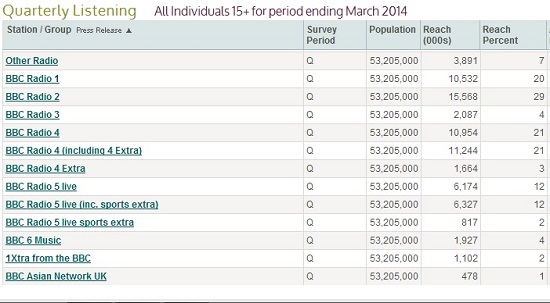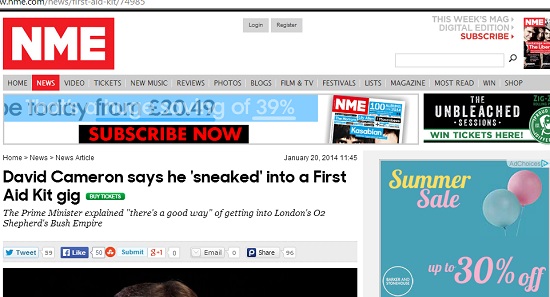Suckered in the morning, wise by teatime but still at sundown an old graze stings again, a dormant papercut refreshed. Initially I was tickled by the fact that 1Xtra had published a list of their most ‘Important Artists In Music’ of which three of the top four were white, nodded at Wiley’s amusement, growled a little at those who thought something could be remedied or set right by the names on that list being more preponderantly black. Never gonna happen. You’re in England, remember. We don’t progress in our racial politics, we just get more self-congratulatory and blind.
Hence the immediate dismissal of criticism, the semantic pirouettes, the insistence that all keepers of the racial order always insist on – ‘it’s not about race’. We’d all expect a list that foregrounds overwhelmingly white male pop names to be defended thus, but what did tweak my nips about the screens I looked at this morning was the deeper, longer narrative about British pop you could see moving under the skin, behind the pixels. "Compiled by industry professionals".
Absolutely goddamned right. I know what quantifies importance for those guys and consequently the list hurts cos it’s true as the FTSE or Nasdaq – the problem is not that Sheeran and Disclosure and Sam Smith shouldn’t be on such a list, the problem is that in terms of ‘importance’ to the music industry and influence over that tired-old keen-young industry’s idea of what ‘black and urban music’ means, Sheeran and the others genuinely ARE influential.
By equating, as we all have to now, ‘importance’ with economic impact, the industry can safely ensure it never seeks out any music straying too far from the golden-aim of ‘crossover’, or that would antagonise a white middle class audience. And so we arrive at a place where a racist, snobbish industry, with the ongoing acceptance of the press, can continue to eliminate and shut out big neglected swathes of the music being made by the people of this country. A fake meritocracy that operates on pure favouritism, that can only push from the margins to the mainstream those names blandly palatable enough, safely connected enough with the existing power-structure, the right school or parents with their feet already in the door and a few hundred-thou in the bank to buy their kids the future they dreamed of.

Part of the problem is the existence of 1Xtra itself. I have problems with that, just like I have problems with the Asian Network and Radio 6 and a lot of the BBC’s specialist networks. I think they benefit older radio listeners to the detriment of kids in need of protecting from the ceaseless power move onslaught of corporate pop. I don’t think those stations benefit the minority communities in a real way because they make it easier for the BBC to continually marginalise those stations’ output away from their ‘one-nation’ voices, thus being able to keep those major stations as safe and neutered and unplayful as possible. Keep the Locals local, the Loyal loyal, and the great unwashed at the edge of music, paddling in the shallows, any depths or drop-offs safely farmed out to those who are prepared for them – the privileged 20-odd percent of listeners and dedicated fans who listen digitally.
Despite the looming big switchover, despite their supposed commitment to digital minority programming, the marketing of BBC radio tells its own story, a massive foregrounding of 1, 2 and 4, an almost dreamlike non-mentioning of anything else unless something cross-platformy (e.g. the Proms, Glastonbury) comes along. It bugs me that the BBC seems content to let its ‘lesser’ brands linger on the margins, comparatively massively under-promoted compared to their flagship networks, while still being under threat of closure should their precarious and small RAJAR figures slip. Beyond that, it bugs me that the major national radio stations are becoming more blanched and ossified, more parochial, more expressive of a primarily white understanding of modern British pop and British musical history. It fits with industry notions of the categories and strictures and shapes pop’s present, past and future must remain within – we have reached a point where, for all its self-piteous life coaching, the idea of pop as transformative of life, rupturing of the intellect, breaking barriers, busting heads, has been all but abandoned. Pop is confirming of life on radio right now, the hand on the shoulder too earnest to even think about straying down and copping a feel or reaching up and tweaking your nose. A soundtrack to your consumerism. The wallpaper of your essentially commercial existence, and thus it has to ‘clean up’ the more rugged genres it pulls from, make garage cosy, make rap tuneful, make grime behave itself and always always always, just as it’s always been in the UK, it’s only white artists who can perform that magical act of thievery, dilution and repackaging, it’s only white artists who can fully reap the benefits of black innovation. Same as it ever was. Same as it ever was.

Pop radio, like the pop it plays, merely waits to settle on your lifestyle. Would never threaten it. Surprise is abandoned, the unforgettable radio moment of chance revelation forgotten in favour of the surety of loyal ratings, quite rightly of course, to stay ‘competitive’. The structure exudes itself an extra layer for this competitive edge, a ‘diverse network’ where the key is knowing your place, the sense of shared learning that was the BBC shattered into shards and target-audiences, a fragmentation in which mutual education stops and private indulgence is sated. In the name of catering for diversity the BBC’s output becomes ghettoised, the playlists become narrower in the precise place where they should be opened up, on the network enjoyed mainly by kids. So black and white kids, the CDE’s lumbered with old ways of listening (as opposed to those agile hyper-connected ABCs who for some reason BBC Radio seem to think are their target audience) listening to Radio 1 get fed only the most watered-down cross-fertilisers and stage-school pootlers in every genre, very-rarely the hardest-core from within those genres, the spitters and shredders who might really challenge but, more importantly, really delight. The three million odd people who listen to 6, Asian Network and 1Xtra are ‘catered for’, certainly – I just wish more of that content could be considered worthy of the rest of us. A bhangra tune, a grime tune, a voice not sanctioned by a major label in the daytime playlist? The national radio station sounding like the nation? Too much to expect perhaps, but some of my most formative pop memories are from when something was put in my day that my day couldn’t deal with, whether that was something odd spun by Annie or Peelie or those odd moments where something non-pop (hip-hop/metal/alternative) crashed into the breakfast playlist. Even yearning for such moments seems antiquated now. Get with the program. You’re catered for, somewhere.

Beyond the individual source of this latest nonsense (and I happen to think that too often 1Xtra is a model of wasted potential) the major fault line in this shitstorm is that word ‘important’. ‘Important’ (like ‘iconic’) is pure management-speak when it comes to music. It means ‘stop here, look no further’. ‘Importance’ will always favour that which finds itself open to compromise, that which can adhere widely, across ‘territories’ and ‘reaches’ and ‘awarenesses’, build up enough agglomerative strength to hit those magic numbers whereby money starts coming your way. And the more often other notions of importance get written out of music, the less likely they are to return or be rediscovered, so the future looms, a hierarchy from old, old roots of race and class, a hierarchy that kids us it’s a meritocracy. At the teat-end, we can’t afford a future anymore. It’s been postponed. So what we must do is engage far more furiously with the present and win ourselves a future. For they, those who have a future, will do anything to prevent us being there. And they have more time than we do to make sure of that, to ensure our vassalage and fealty or if we refuse, shut us out from the system altogether. It’s colder than it’s ever been out there. What are you willing to give up to make it?

Of course, as they’re idiots for making these lists, we’re idiots for paying attention to them, but I’m sure ‘importance’ meant something else once. Or at least, could mean something more than just mercantile credit, a canny investment. As politics has delegated its responsibilities to business, so goes so much critique (so much ‘content’ about music is too content about music), analysis becomes a look at the figures and stats, appreciation a tacked-on checklist of tired cross-reference and cliché. I loathe the idea of a ‘Power List’ but it’s a bitter pill we should suck on a while cos it suits these mendacious, craven times, is something of a perfect emblem of the endlessly infantile listed ordering and Top Trumps competitiveness that comes when a culture is looked at through backwards opera-glasses from the safe remove of the capital, fogged by chortling. ‘Power’ and ‘importance’ are useful things to write about because you don’t have to write about the music, and they’re particularly useful things to hide behind when ostensibly speaking for music fans you don’t understand. Y’know, just like Jay-Z is the most important rapper of the previous decade, Kanye the most important rapper of this decade. Nothing to do with music, all to do with the most superficial of impressions, the bullying of airtime, the weight of hashtags and clicks: ‘importance’ and the search for it is a way for a lazy white superstructure to ameliorate its guilt about its own ignorance, the blatant contrast between its love of ‘serious’ white music in all its variety, its faint distaste for investigating anything bar the most obvious, deodorised or corporate-backed music from the other side of the racial tracks.
I know, change the record, been backspinning this a while now. But what unsettled me this morning was my own unsettlement. At my age, you might want to be resigned to this stuff cos you’ve experienced it so many times in your life as a pop fan, British pop’s superiority complex about black music, the pat on the back it gives itself for when it reintroduced black American music to white America, the enabled entitlement to turn a blind eye to what’s going on now down its own streets. The elbows it throws out to ensure that any such flourishing of interest in black music from within our own borders can’t get any oxygen, light, a chance to grow or go beyond the grassroots of localised scenes, without blanching itself with a touch of folk, a pinch of house, something to make it palatable to the playlisters.
Reading the ‘power’ list, I had that not altogether unfamiliar feeling of apprehending how much worse things are getting, especially as the majors, the PR and the press get increasingly sewn up by an ever-narrowing class and race base. One of the most magical things about music is that it is communication between people unlikely to meet, a window into other worlds that are going on alongside your own, a response to urges you didn’t know you had. By reducing music to a lucrative centre of overarching dullness creatively fed and sustained by margins of ever-dwindling opportunity, the BBC are part of the damaging process of centralisation and conformity currently strangling the life out of pop and eliminating wonder from the charts. By qualitatively reducing music’s analysis to an almost-mathematical evaluation of ‘mobility’ within markets, the ‘Power List’ eerily mirrors an entirely corporate and governmental idea of what music and the creative industries should be all about. By talking about it, of course, we’re all merely adding to the ‘success’ 1Xtra doubtless see the list as being, but our conclusions should be clear. Turn your back on the powerful. Seek the powerless. Fuck the statisticians. Do your own digging.


